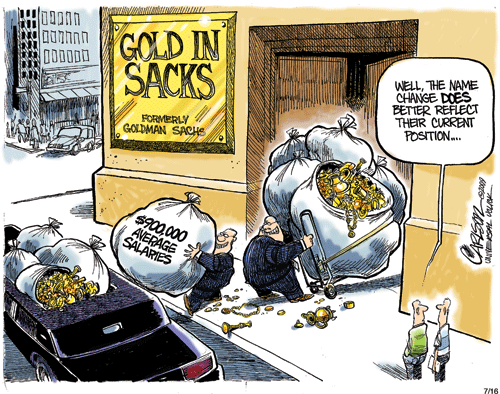The SEC has charged Goldman Sachs with fraud. The charges are for selling a rigged CDO package to investors, but failing to disclose that the package was designed by a hedge fund operator as a bet against the housing market. The hedge fund, Paulson & Co., would short the bonds in the package if the housing bubble burst. Goldman didn’t tell that to investors, who ended up losing when the fund went south. Rick Unger from True/Slant explains:
The charges revolve around a package of mortgage securities called Abacus 2007-AC1. Here’s how it worked-
At the request of a hedge fund operator named John Paulson, a guy who earned $2.7 billon in 2007 betting that the housing bubble was going to pop, leaving many mortgages in distress, Goldman created the fund allowing Paulson to choose the mortgage bonds he wanted included. They were all bonds that Paulson believed were the most likely to lose value and, therefore, the ones Paulson most wanted to bet against.
Goldman then – allegedly – went out and sold the Abacus deal to overseas banks, hedge funds and other large players, knowing that the package had been purposefully constructed to lose its value. They allegedly lied about who had chosen the mortgage bonds included as their victims would have known what was going on had they been told that Paulson was picking them.
A big win for Mr. Paulson – a big loser for all the customers Goldman fleeced by enticing them to buy into the deal, expecting to make money when the value of the bonds went up.
Zero Hedge has more details:
According to the SEC’s complaint, the deal closed on April 26, 2007, and Paulson & Co. paid Goldman Sachs approximately $15 million for structuring and marketing ABACUS. By Oct. 24, 2007, 83 percent of the RMBS in the ABACUS portfolio had been downgraded and 17 percent were on negative watch. By Jan. 29, 2008, 99 percent of the portfolio had been downgraded.
Goldman Sachs responded by saying “the SEC’s charges are completely unfounded in law and fact and we will vigorously contest them and defend the firm and its reputation.” The company claims that it did not know in advance whether its financial investments would increase or decrease, or that the housing market was going to go bust.
The New York Times has a complete report on the Goldman/SEC case.

